
DO NEWCOMERS collectively change a place, or are they themselves changed by the place? It is a question worth asking of the massive migrant-worker population of Shenzhen, China’s most densely packed city as well as being one of its most technologically advanced and financially savvy.
22-year old Shenzhen yoga instructor and five-star hotel employee Jane Zhang from Henan has already left her mark on the city.
She is the picture of poise in a city pulsing with the ever-present push-pull of pressures and possibilities.
She is the first of two daughters, and her parents both still till the family farm back in rural Henan province, wherer the slow-paced life could not be more far removed than the frenetic pace of life in Shenzhen – which has grown from proverbial “backwater fishing village” status to one of the country’s most populous city in just three short decades.
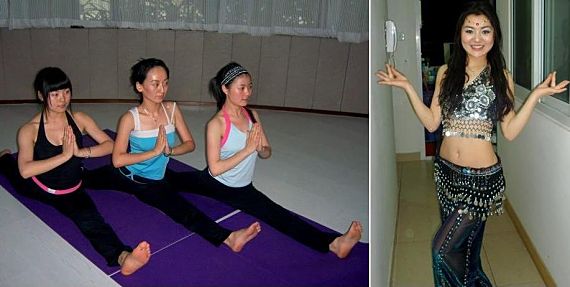
Serving as the launching pad for former PRC leader Deng Xiaoping’s inaugural Special Economic Zone (SEZ), Shenzhen now has the country’s No.2 port and No.2 capital market – and leads the nation in one dubious honor – most densely packed metropolis.
But amid all this change and seeming disorder, Jane Zhang brings a semblance of peace and tranquility to a city mad with making money, and she definitely has a gift for ratcheting down the anxiety in a room (possessing a radiant smile does half the trick no doubt).
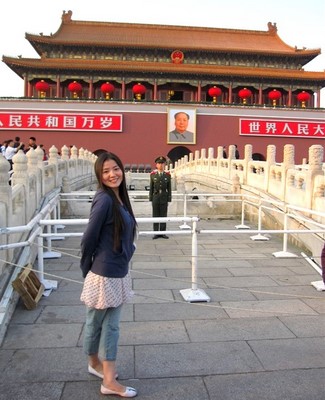
Her pre-Shenzhen background was one I have oft heard in that it had as much to do with her new life in this big city as apples did to oranges.
“I studied computers in technical school back in Henan before coming here in 2007. But since arriving, I must say that my work here hasn’t had much to do with computers. However, I have no regrets about that because let’s face it, no matter what you do, computers and other forms of electronic communication and information gathering devices impact us all on a daily basis, like it or not,” she said.
I told her that her background in computers was nevertheless an interesting academic path, being the daughter of two farmers in the rural portions of Henan province.
And that packing up and moving to the tropical, commercial “city-on-steroids” of Shenzhen – the polar opposite of the North China countryside – could not be a bigger leap for an 18-year old girl to make at the time.
“Well, my parents may not have had much, but I think that has motivated them to want more for me and my younger sister. She has also left the farm, so to speak, and is now at law school studying to be a lawyer.”
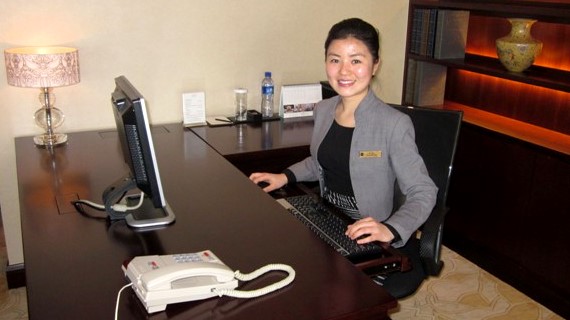
However, Ms. Zhang did provide a common reply to the question: “Why Shenzhen?”
“For the money, at least at first. With my computer training, I knew that work opportunities in Shenzhen would be far greater than back home. I was right about the opportunities, and landed a job here just two weeks after arriving,” she said.
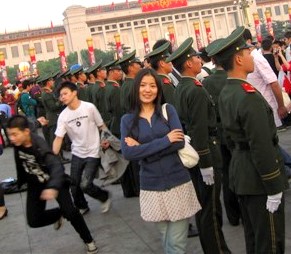
I was very surprised and fascinated to learn that her first position in Shenzhen upon arriving in 2007 was at a “foreign”-owned facility that has been in the news of late – all for the wrong reasons.
“I remember arriving at the time and being all in flux and in a state of constant disorganization. I was living at a guesthouse with no income at the time, trying to figure out where to wash, hang and iron my clothes so as to be presentable for any job offers that might pop up. Luckily, one of my first tasks upon arriving was submitting my resume to the local employment agency which a few days thereafter called me with news that Foxconn was interested in meeting me.
Taiwan-based Foxconn’s website describes itself in this way:
“Guided by a belief that the electronics products would be an integral part of everyday life in every office and in every home, Terry Gou founded Hon Hai Precision Industry Company Ltd, the anchor company of Foxconn Technology Group in 1974 with US$7,500, a devotion in integrating expertise for mechanical and electrical parts and an uncommon concept to provide the lowest "total cost" solution to increase the affordability of electronics products for all mankind. Today, Foxconn is the most dependable partner for joint-design, joint-development, manufacturing, assembly and after-sales services to global Computer, Communication and Consumer-electronics ("3C") leaders.”
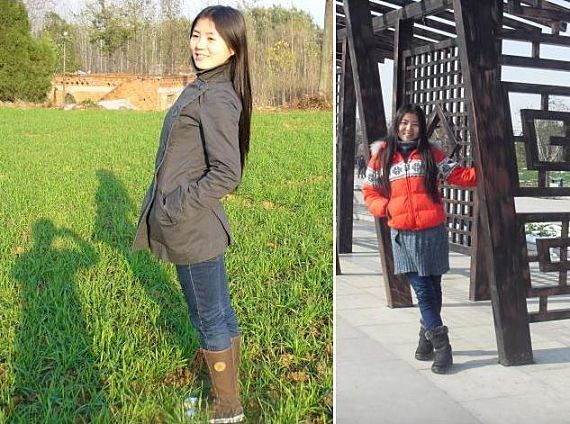
Any of us who use a cell phone, laptop, or iPhone/iPad should know that there is a good chance that some of the over one million workers employed by the firm – mainly at their Shenzhen factory complex – have played a part in these products’ production at some stage of the assembly process.
However, at least 17 Foxconn workers have taken their own lives over the past several months, with one succumbing to exhaustion on the job late last year. So having beside me for an exclusive interview a former employee of Shenzhen’s largest private employer was an ideal forum to find out what life was really like in this virtual “factory city.

“I quickly landed a job at Foxconn as a departmental assistant in the handset division, so at least I was able to use computers on a regular basis, though I remember spending most of my time on the phone making and rescheduling appointments,” Ms. Zhang said.
“As for the recent rash of suicides, I don’t recall ever hearing about this during my time there. That all began happening after I left. Personally, I don’t think the suicides were specific to Foxconn. I think if we were to look behind the numbers, we would see that with a workforce of over one million, these things are bound to happen now and then, and I believe the rate is similar to the general population. My hunch is that if one were to investigate the individual cases of each personal tragedy, the tipping point would most likely be a romance gone sour or overbearing homesickness, not an abusive work environment.
“I felt the pressure at that place was no different than anywhere else. It was manageable,” she said.
She put in a year at Foxconn before shifting gears and trying her hand in the furniture business.
Senyuan Furniture Group’s 100,000 square meter Shenzhen plant employs 1,000, where Ms. Zhang worked as an administrative assistant.
“I mainly sat behind the front counter answering phones and making appointments for higher-ups,” she said.
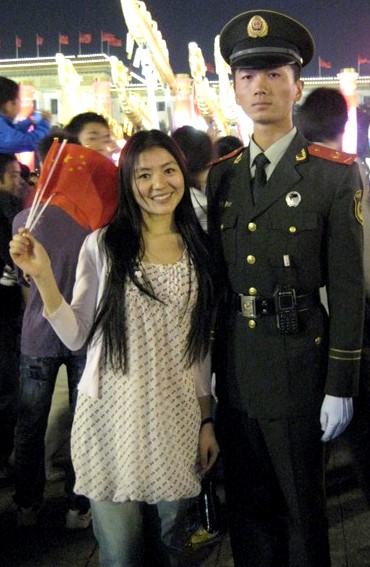
But this constant communication with dozens of different people – both on the outside and within the firm – clearly had an effect on Ms. Zhang, and she is an extremely attentive and outgoing young professional with a great deal of confidence.
While at Senyuan, she said she often got antsy sitting down all day, and felt too tired for her age at times.
“Also, it was rather hectic at times both answering calls about how to find our factory while having a supervisor beside me dictating figures to input into the computer. So I was more than happy to oblige a colleague’s invitation to join her for yoga lessons in downtown Shenzhen. Little did I realize that I would immerse myself in it so much, that just three months later I ‘graduated’ and was myself made an instructor at the center.”
I reminded her that India introduced Buddhism to China a few millennia ago, and she was now helping spread another cultural stalwart from the subcontinent throughout her homeland.
“Well, I don’t consider myself a ‘missionary.’ There is a spiritual component to yoga, but nothing is forced, and it is mainly taken up by people seeking to find more balance in their hectic lives. Personally, it helped me re-learn how to relax, and find serenity amid seeming chaos, even in the middle of a workday.”
However, she says her current position with concierge services at Shenzhen’s five-star 548-room Futian Shangri-La Hotel is what she calls a “perfect position” for her.
“The Shangri-La is a very stable position with a family-like feel. I am not stuck at a desk or behind a counter all day. In fact, I discovered that I actually like being the center of attention sometimes, and this position allows that. I am not at all afraid of speaking to large groups or even being on stage during some of the hotel’s activities.”
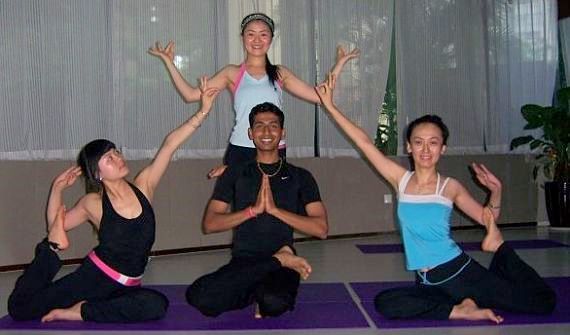
She said she has few regrets about making the move to Shenzhen four years ago, and has never looked back.
“Shenzhen is indeed a much faster-paced lifestyle than back in Henan. The rhythm of life there is decidedly slower. But I have an interesting job and the solace of yoga to help me keeps things in perspective.
“Yes, this city can sometimes seem cold and impersonal, and there is a bit of calculating practicality to a lot of people, always thinking zero-sum for all business transactions. But luckily I don’t have to deal with that. I only hope that the guests that stay in our hotel conduct themselves ethically outside of these walls, but it is my job to make sure their stays are enjoyable and they keep coming back.
“So you see, we also want their continued patronage too, so we are all business-savvy here in Shenzhen.”
Although the city can be a bit rough and tumble at times, with the well-heeled and unwashed often rubbing shoulders in the same crowded yet pristine and glittering high-end shopping centers, she says that things are improving on the civility front.
“I am less likely to hear cuss words in Shenzhen than back home in the countryside. I am not a big fan of cuss words,” she said, matter of factly.

As one of China’s most business-savvy cities, I asked her if she was some day looking to invest long term in the city in some fashion.
“I am just starting out on my career, so it is a bit premature to talk about where to invest my nest egg. But when the time comes, I think I will be at ease with where I put my money, because I will certainly have done all the research and know exactly what to expect. People are people, and just because they come to a city with more outsiders than natives doesn’t mean they necessarily change for the worse.
“I don’t think I have changed fundamentally since coming here. Actually, I think yoga helps you maintain your core being. You should try it,” she suggested.
But she said she didn’t plan to stay here forever.
“I don’t think this is such an ideal city to grow old in. In fact, if you pay attention, you don’t really see too many elderly people walking the streets. This is a very young city, with young people. It is geared to the youth, and I think the pace would drive retirees to distraction – if they let it.”
Were her parents – proud farmers from the north – at all distressed when their eldest child announced four years ago that she was heading 2,000 kilometers south to seek her fortunes in the big city?
“They were a bit concerned at first because I was only 18 and didn’t speak a word of Cantonese. However, I have found that not speaking that dialect presents no barriers to employment here. My parents didn’t protest my coming here, but were of course worried as I came without a job offer in hand. But they knew it was the right move. Everyone has to grow up eventually.”
Ms. Jane Zhang can be reached at:

Read about other Shenzheners:
SHENZHEN ‘Not As Warm As Harbin,’ Says Newcomer From North
SHENZHEN EXPAT: Briton Walking On The Wild Side
'Model Migrant', 21, Turning Heads In Shenzhen







